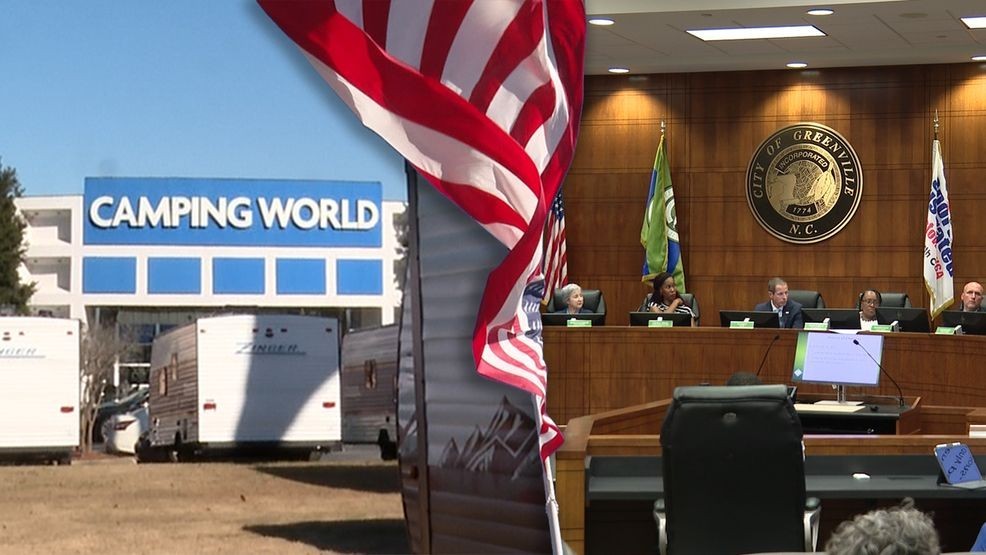## Flag Wars: Greenville vs. Camping World – Who’s Right About the Big One?
Imagine a giant American flag, billowing proudly over a sprawling retail lot. Now picture that same flag becoming a battlefield in a legal war between a city and a national chain.
Welcome to the bizarre and surprisingly heated battle between Greenville, North Carolina, and Camping World, where a simple display of patriotism has escalated into a multi-thousand dollar lawsuit over unpaid fines.

Details of the Lawsuit: City’s Claims and Demands
The City of Greenville has filed a 28-page lawsuit against Camping World, alleging that the company has repeatedly violated a local ordinance regarding flag sizes. This ordinance limits flags to 216 square feet. Camping World, however, installed a 3,200-square-foot American flag at its Evans Street location, prompting the city to issue fines.
According to the lawsuit, the fines began at $50 on the first day, increased to $100 the next day, and have been $250 every weekday since. As of the filing of the lawsuit, Camping World owes the city over $21,000 in unpaid fines.
The lawsuit seeks several remedies, including the immediate removal of the oversized flag, payment of the outstanding fines, and the imposition of additional civil penalties.
Camping World’s Defense: Lemonis’ Stance and Potential Outcomes
Camping World CEO Marcus Lemonis has publicly stated his intention to keep the flag in place, regardless of the legal ramifications. “The flag is not coming down…not if I lose the lawsuit, not if they fine me a million dollars, not if they lock me up in jail,” Lemonis declared in a previous interview.
This defiant stance suggests that Camping World is prepared to fight the lawsuit vigorously, potentially leading to a protracted legal battle. The outcome of this case could have significant implications for both parties involved.
For the City of Greenville, a successful outcome would affirm its authority to enforce local ordinances and maintain aesthetic standards. Conversely, a loss could weaken the city’s position in future disputes and potentially set a precedent for challenging similar regulations.
For Camping World, a victory would underscore its right to express patriotism and potentially empower other businesses to challenge restrictive local regulations. However, a loss could result in hefty fines, reputational damage, and legal costs.
Implications for Freedom of Expression and Local Governance
The dispute between Camping World and the City of Greenville raises important questions about the balance between freedom of expression and local governance.
Freedom of Expression
Advocates for Camping World argue that the display of the flag is a form of protected speech, representing patriotism and national pride. They contend that the city’s ordinance infringes upon this right by restricting the size of the flag.
Conversely, the city of Greenville maintains that its ordinance is necessary to prevent distractions for drivers and preserve the city’s aesthetic quality. They argue that the oversized flag creates a safety hazard and detracts from the visual appeal of the city.
Local Governance
The case highlights the challenges local governments face in balancing competing interests. On one hand, cities have a responsibility to maintain public order and safety. On the other hand, they must also protect the rights of individuals and businesses to express themselves freely.
The outcome of this lawsuit could have a significant impact on how local governments approach similar issues in the future. A ruling in favor of Camping World could embolden businesses to challenge other local regulations, while a ruling in favor of the city could strengthen its ability to enforce its ordinances.
Conclusion
So, there you have it: the City of Greenville versus Camping World, a clash of local ordinances and patriotic fervor. While the battle over the massive American flag may seem like a trivial one, it raises important questions about the balance between local regulations and individual expression. Camping World argues that their flag is a symbol of national pride and should be exempt from size restrictions, while the city maintains that these rules are necessary to ensure public safety and aesthetic harmony. This case highlights a common tension in American society: the struggle to reconcile personal liberties with the needs of the community. It’s a debate that will likely continue as cities grapple with the ever-changing landscape of public expression, especially in the digital age. Will we see more cases like this, with individuals and businesses pushing the boundaries of what’s acceptable? Or will this be a watershed moment, encouraging a more nuanced approach to balancing individual freedom with the common good? One thing’s for sure: the fate of that giant flag isn’t just about a piece of fabric; it’s a symbol of a larger conversation we’re having about our values as a nation.
